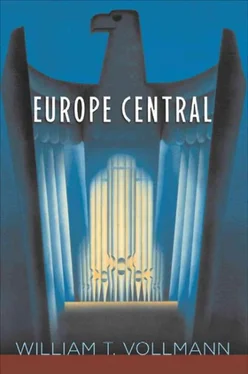455 Ludwig Gerstein: “If you want to live a worthy life, Kurt, you must never treat a woman badly. A woman, you know, bears no weapons in her hands”—Substantially “retranslated” and abridged from von Eschenbach, p. 268 (the hermit Trevrizent to Parzifal).
457 Die Ostschweiz headline on the Hungarian Jews: “People are Disappearing” —Mentioned by the Auschwitz-Birkenau State Museum in Oswiecim, p. 254 (Henryk Swiebocki, “Disclosure and Denunciation of SS Crimes”).
458 Description of Roman Karmen’s body language as he filmed the captured Nazis of Maidanek—After a photo in Ognev.
458 Details on the suppliers on Zyklon B and Gerstein’s own shadowy but probably negligible role in supplying Asuchwitz—Friedländer, pp. 184-88. There is no record of Gerstein’s ever having any such conversation with Höss as the one which I have imagined. Presumably he must have had close calls here or elsewhere.
460 Gerstein to his wife: “What action against Nazism…”—Gerstein testimony of 1945; in Friedländer, p. 160.
461 Signal magazine: “‘I’ll have the second from the right,’” says Hilde…”—Mayer, op. cit. The following sentence, “I don’t care how many bombs they drop…” is my invention. The repaired shop window through which Hilde is bravely peering was damaged by an Allied air raid.
462 Gerstein to Hochstrasser: “If Hitler should lose, he’ll slam the door…”—Loosely after Gerstein to Nieuwenhuisen, to whom Gerstein was in fact speaking; in Friedländer, p. 163.
462 “They” at Oranienburg: “What you see here makes you either brutal or sentimental” —Klee et al, p. 163 (letter from S.S.-Obersturmführer Karl Kretchmer, Sonderkommando 4a, 27 September 1942).
463 Details on Ravensbrück concentration camp—Based on Germaine Tillion, Ravensbrück: An Eyewitness Account of a Women’s Concentration Camp, trans. by Gerald Satter-white (Garden City, New York: Anchor Books, 1975).
464 Gerstein’s father: “Hard times demand hard methods”—Friedländer, p. 203.
466 Dr. Pfannenstiel to Gerstein: “You’re the man who invented the gas chamber”—An allegation (not made specifically by Dr. Pfannenstiel or anyone) quoted by Balfour.
466 Dr. Pfannenstiel: “I noticed nothing special about the corpses…”—Friedländer, p. 118 (Pfannenstiel’s testimony before the Darmstadt Court, 1950, slightly abridged).
466 Gerstein on the pink color of the corpses killed by Zyklon B—Described in The Auschwitz-Birkenau State Museum in Oswiecim, p. 168 (Franciszek Piper, “The Mass Extermination of Jews”).
466 Dr. Pfannenstiel: “Can science devise a way to render this process of exterminating human beings devoid of cruelty?”—In his postwar testimony before the Darmstadt Court, Pfannenstiel actually said: “I wanted to know in particular if this process of exterminating human beings was accompanied by any acts of cruelty” (Friedländer, p. 118). I would think that my alteration does perfect justice to his thought processes during the days when he could participate in the Holocaust with impunity.
466 Gerstein and Helmut Franz on Kollwitz’s “Volunteers”—Imagined by me. Helmut Franz’s views on the need to respect evil and leave it alone are based in part on the argument in von Franz’s Shadow and Evil in Fairy Tales.
466 The same conversation, on voluntarism and willing Hitler to be good—Somewhat based on Rudolf Hess’s notion of loyalty to Hitler, as quoted in Krebs, pp. 206-07. Hess actually does compare himself to Hagen.
468 “Let gape the gates!”— Poetic Edda, p. 151 (“Svipdagsmál,” stanza 43).
470 “Clever Hans” Günther’s victims: two hundred thousand Jews in Bohemia and Moravia—Richard Overy, Interrogations: The Nazi Elite in Allied Hands, 1945 (New York: Viking, 2001), p. 369 (HQ BAOR, interrogation reports from No. 1 Sub-Centre, 3-10 December 1945).
470 Gerstein to his father: “You are wrong about one thing…”—Levin, p. 310; Friedländer, p. 208 (“retranslated” a little).
470 Gerstein to his wife: “People will hear about me…”—Friedländer, p. 211.
471 “It may be that the mere fact of making such efforts…”—Friedländer, pp. 198-99 (Frankfurt court document, 1955).
471 Göring: “Anybody can make an atrocity film…”—G. M. Gilbert, Ph.D., Nuremberg Diary (New York: Da Capo, 1995, repr. of 1947 ed.), p. 152 (15 February 1946). Göring was of course sentenced to death. It may be worth noting here that his wife told him: “I shall think you died for Germany!” and “then all suffering vanished from his face.” Her verdict: “He was devotion and goodness incarnate.”—Emmy Goering, My Life with Goering (London: Bruce and Watson Ltd., 1972), pp. 157, 159.
THE SECOND FRONT
472 Epigraph—Vladimir Karpov, ed. [photos; with text by Georgii Drozdov and Evgenii Ryabko, trans. Lydia Kmetyuk], Russia at War: 1941-45 (London: Stanley Paul, 1987), p. 17.
472 Chuikov’s decorations—He also received eight Orders of Lenin and one order of the Red Star. He was not promoted to Field-Marshal until 1955.
472 Assessment of Chuikov’s military prowess—After the brief biography by Richard Woff, in Shukman, pp. 67-74. I forgot to mention that during the Nazi-Soviet Pact he’d participated in the heroic liberation of East Poland from the Poles.
472 Chuikov: “The black humped shapes, like camels on their knees, of dead enemy tanks.”—Op. cit., p. 18.
473 Chuikov: “The spring was with us, but behind the enemy’s lines it was autumn”—Ibid., p. 17.
473 Chuikov: “This long delay in the opening of the second front…”—Ibid., p. 20.
473 The stanza from Marina Tsvetaeva: “You can’t withstand me…”—Tsvetaeva, p. 43 (“Where you are I can reach you” [1923]), “retranslated” and slightly truncated by WTV.
476 “There were tears in the men’s eyes…” — Modern Art Museum catalogue, unnumbered p. 4.
476 Situation of Chuikov in March 1943—After Richard Woff, in Shukman, p. 72; John Erickson (“Malinovsky”), in the same work, p. 120; John Erickson, The Road to Berlin: Stalin’s War with Germany, vol. 2 (New Haven, Connecticut: Yale University Press, 1983), pp. 45-64; Great Soviet Encyclopedia, vol. 29, p. 195, which also gives information on Chuikov’s various decorations.
477 The trembling of Paulus’s hand when he lit a cigarette— Erzählungen über mein Schaffen, orig. p. 32; Hau-Bigelow, p. 5.
477 Karmen’s simile of the waterfall—After the same document, pp. 32-33, Hau-Bigelow, p. 5.
477 Soviet gratitude for Lend-Lease items—I quote the Great Soviet Encyclopedia ’s entry on this program: “The deliveries made under lend-lease spurred US production during the war and promoted the enrichment of the monopolies at the expense of the government.”
478 Karmen on remembering everything—After Erzählungen über mein Schaffen, p. 36, Hau-Bigelow, p. 7 (“Again the ruins of Berlin flash by… And again I try not to forget, as I [tried] two years earlier in Stalingrad, not the smallest, not a single detail of this historic event”).
479 “Dziga Vertov’s seven-reel declaration of love for the women of our Soviet military forces”—Made in 1938, but not widely distributed since by then this filmmaker was getting isolated for his “formalism.” As the saying goes, he died in obscurity. I wish I had found time to add a story about the rat-infested basement where the young Dziga Vertov edited Kino-Pravda, or the strange coincidence by which his “Three Songs of Lenin” was so well received by the Italian Fascists that it won a prize at the Venice Film Festival of 1935.
Читать дальше












